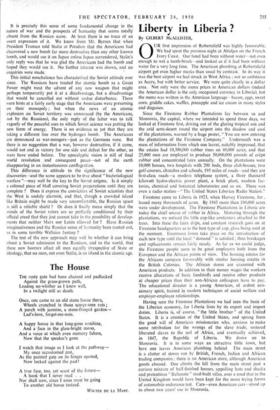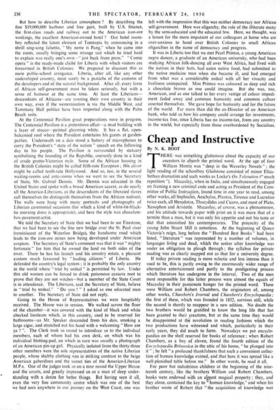Liberty in Liberia ?
By GILBERT McALLISTER,
0 UR first impression of Robertsfield was highly favourable. We had spent the previous night at Abidjan on the French Ivory Coast. Our hotel had been without water—not even enough to wet a tooth-brush—and looked as if it had been without water for a very long time. The American plumbing at Robertsfield airport got even higher marks than usual by contrast. In its way it was the-best airport we had struck in West Africa ; not so ambitious as Accra, but with better service. We were quite clearly in a dollar area. Not only were the menu prices in American dollars (indeed the American dollar is the only recognised currency in Liberia), but the menu was written in the American language—bacon, eggs, sweet corn, griddle cakes, waffles, pineapple and ice cream in many styles and disguises.
Since the Firestone Rubber Plantations lay between us and Monrovia, the capital, where we intended to spend three days, we looked at Firestone first, driving out of the glaring tropical sun and the arid semi-desert round the airport into the shadow and cool of the plantations, warned by a huge poster, "You are now entering the plantations of the Firestone Company." Underneath was a mass of information from which one learnt, suitably impressed, that the estates had 10,500,000 rubber trees on 80,000 acres, and that 25,000 men are employed to produce 50,000,000 pounds of crepe rubber and concentrated latex annually. On the plantations were 10,000 houses, two hospitals with 200 beds, three club-houses, two golf-courses, churches and schools, 195 miles of roads—and they are first-class roads—a modern telephone system, a three thousand kilowatt hydro-electric power plant, a brick plant, modern fac- tories, chemical and botanical laboratories and so on. There was even a radio station—" The United States Liberian Radio Station."
Firestone came to Liberia in 1923, when Harvey Firestone, Jnr, , leased many thousands of acres. By 1943 more than 100,000 acres were under development. The Firestone Plantations in Liberia are today the chief source of rubber in Africa. Motoring through the plantations, we noticed the little cup-like containers attached to the trees. Into these the latex drips, and constant research goes on at Firestone headquarters as to the best type of cup, glass being used at the moment. Enormous losses take place on the introduction of each new type until the local " demand " is satisfied ; then breakages and replacements remain fairly steady. As far as we could judge, the Firestone people seem to be good employers both from the European and the African points of view. The housing estates for the Africans compare favourably with similar housing estates in the British Colonies. The African stores are crammed with American products. In addition to their money wages the workers receive allocations of basic foodstuffs and receive other products at cheaper prices than their non-African colleagues have to pay. The educational director is a young American, of ardent mis- sionary spirit, trained in modern techniques of social welfare and employer-employee relationships.
Having seen the Firestone Plantations we had seen the basis of the Liberian economy, for Liberia lives by its export and import duties. Liberia is, of course, "the little brother" of the United States. It is a creation of the United States, and sprang from the good will of American missionaries who, anxious to make some retribution for the wrongs of the slave trade, restored liberated slaves to the soil of Africa, and eventually achieved, in 1847, the Republic of Liberia. We drove on to Monrovia. It is in some ways an attractive little town, but here one leaves American plumbing behind. The main street is a clutter of stores run by British, French, Indian and African trading companies ; there is no American store, although American goods abound. One climbs the hill from the main street past a curious mixture of half-finished houses, appalling huts and shacks and pretentious " Italianate " mud-built villas, over a road that in the United Kingdom would have been kept for the more trying forms of automobile endurance test. Cars—even American cars—stand up to about two years' use in Monrovia. But how to describe Liberian atmosphere ? By describing the fine $19,000,000 harbour and free pprt, built by U.S. finance, the first-class roads and railway out to the American iron-ore workings, the excellent American-owned hotel ? Our hotel room- boy reflected the latent element of Tomtopia by announcing in a shrill sing-song falsetto, "My neme is Pang," when he came into the room, usually bringing some strange suit which he tried hard to explain was really one's own—" just back from press." "Comic opera" is the ready-made cliché for Liberia with which visitors are forearmed in British Colonies. We prepared to discount this as mere public-school arrogance. Liberia, after all, like any other undeveloped country, must surely be a pastiche of the customs of the developers and of the natural background. After all, every form of African self-government must be taken seriously, but with a sense of humour at the same time. At least the Liberians— descendants of Africans—are running their own country in their own way, even if the westernisation is via the Middle West, and Tammany Hall politics have been imported along with the Palm Beach suits.
At the Centennial Pavilion great preparations were in progress. The Centennial Pavilion is a pretentious affair—a mud building with a layer of stucco—painted gleaming white. It has a flat, open- balconied roof where the President entertains his guests at garden- parties. Underneath on a dais stood a battery of microphones to carry the President's "state of the nation" speech on the following day to his people. The Pavilion is surrounded by statuary symbolising the founding of the Republic, unevenly done in a kind of crude grotto-Victorian style. Some of the African housing in the British Colonies might be called fifth-rate European ; this decor might be called tenth-rate Hollywood. And so, too, in the several waiting-rooms and ante-rooms when we went to see the Secretary of State, Mr. Gabriel Dennis. Mr. Dennis was educated in the United States and spoke with a broad American accent, as do nearly all the Americo-Liberians, as the descendants of the liberated slaves call themselves (to distinguish themselves from the African natives). The walls were hung with many portraits and photographs of Liberian ceremonial occasions (for which a kind of white-tie-black- tie morning dress is appropriate), and here the style Was chocolate- box-pavement-artist.
We told the Secretary of State that we had been to see Firestone, that we had been to see the fine new bridge over the St. Paul river (reminiscent of the Waterloo Bridge) i the handsome road which leads to the iron-ore mines now being developed under American auspices. The Secretary of State's comment was that it was "mighty fortunate" for him that he owned the land on both sides of the river. There he has his launch and his country estate, a pleasant custom much favoured by "leading citizens" of Liberia. He defended the country's legal system ; it is probably the only country in the world where "trial by ordeal" is permitted by law. Under this old women can be forced to drink poisonous cassava root to prove that they are not witches—but a member of the State Court is in attendance. The Liberians, said the Secretary of State, believe in "trial by ordeal." "Do you ? " I asked as one educated man to another. The Secretary of State did not reply.
Going to the House of Representatives we were hospitably received. The House was in session. We walked across the floor of the chamber—it was covered with the kind of black and white checked linoleum which, in this country, used to be reserved for bathrooms—as Mr. Speaker descended from his dais, smoking a large cigar, and stretched out his hand with a welcoming "How are ya ? ". The Clerk took us round to introduce us to the indivdual members, each of whom had his own desk, on which was his individual blotting-pad, on which in turn was usually a photograph of an American pin-up girl. Physically isolated from the thirty-three other members were the sole representatives of the native Liberian people, whose shabby clothing was in striking contrast to the beige American gaberdines and the sunset ties of the Americo-Liberian M.P.s. One of the judges took us on a tour round the Upper House and the courts, and greatly impressed us as a man of deep under- standing with I desire for better things. But having seen it all, eveal the very fine community centre which was one of the best we had seen anywhere in our journey on the West Coast, one was left with the impression that this was neither democracy nor African self-government. Here was oligarchy, the rule of the illiterate many by the semi-educated and the educated few. Here, we thought, was a lesson for the more impatient of our colleagues at home who are over-anxious to hand over British Colonies to small African oligarchies in the name of democracy and progress.
It was in Liberia too that we met Pearl Primus, a young American negro dancer, a graduate of an American university, who had been studying African folk-dancing all over West Africa, had lived with the natives in their huts, had eaten native food, had submitted to the native medicine man when she became ill, and had emerged from what was a considerable ordeal with all her vivacity and liveliness unimpaired. Miss Primus was coloured as deep and rich a chocolate brown as one could imagine. But she was, too, American, and as one talked to her every vestige of colour impedi- ment faded away and .common humanity and common culture asserted themselves. She gave hope for humanity and for the future of the world. Far more than did the ex-Director of an American bank, who told us how his company could arrange for investments, income-tax free, since Liberia has no income-tax, from any country in the world, but especially from those overburdened by Socialism.



































 Previous page
Previous page